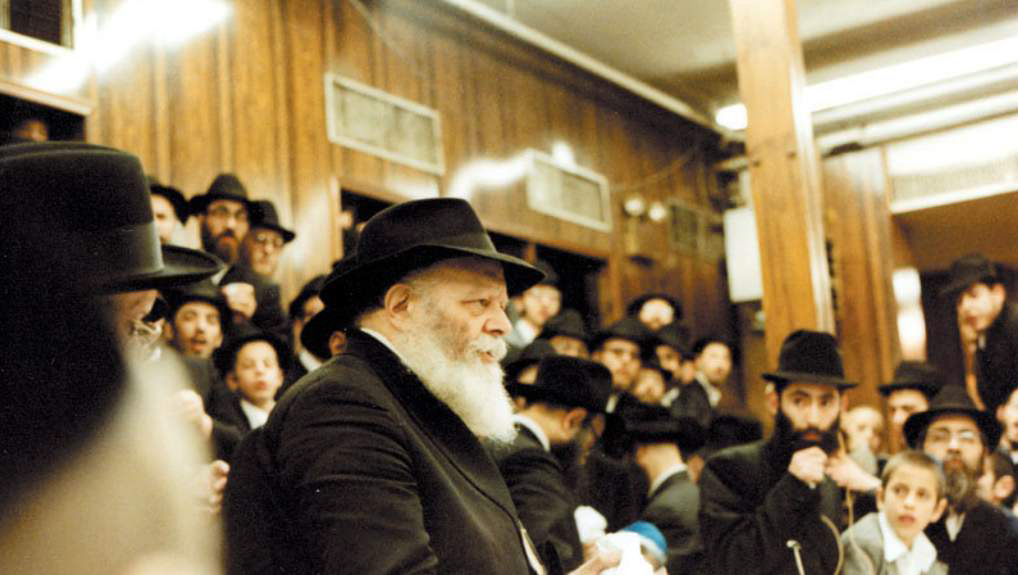Secret Service
| March 13, 2019
Someone Else’s Son
My father had come to Lakewood for a grandchild’s bar mitzvah. That morning in shul, he noticed that a young bochur standing near him had holes in his shoes. My father gave the boy $150 and told him to go buy new shoes.
A few days later, my stair carpet came loose, and I called a repairman to fix it. The worker who came was a frum, cheerful man with a foreign accent, obviously an immigrant. He looked like such an erlich person — hardworking but full of emunah.
As he worked, he told me, “A few days ago, when it was freezing outside, my son asked me for money to replace his old shoes which had holes in them. With tears in my eyes, I told him that I couldn’t afford it right now, but he should ask Hashem to send him shoes. That day, my son came home with a gorgeous, expensive new pair. He said a man in shul had given him the money for it.”
My heartbeat quickened, but I didn’t say a word. I knew my father likes to keep his anonymity. When I asked my father why he gave the boy the money, he just shrugged and said, “If my son needed new shoes, wouldn’t I buy them for him? So what if this boy was someone else’s son?”
N.L., Lakewood
Three-tiered Caring
Around ten years ago, I ran a mail campaign for a widow and her 13 children, whose husband and father, the breadwinner of the family, had passed away after a year’s illness. I can’t recall the details now, but it was a beautiful, choshuve family from a small city in Eretz Yisrael. The widow was marrying off her third child and relying on our help to do so.
Our friend, Rabbi B., who had gotten me involved, knew the members of this family and the difficulties of their life. We advertised, sent out the envelopes, and made personal visits to potential donors. The money was slowly coming in. Then one evening, a woman called and spoke to my wife. She was an acquaintance who had received the donation envelope, and she wanted to know if I knew the family in question.
“My husband has not met them, but his close friend Rabbi B. knows the situation firsthand and has verified all the details,” my wife said.
“In that case, if the need is absolutely genuine, I really want to help them,” said this lady, who was of modest means. “I have a three-tiered pearl necklace that I received as a kallah. I only need one row of pearls. I’m going to sell the rest to a jeweler and bring you the money.”
J.G., London
The Gift of Love
Looking back, I now know that Tzirel’s story was a tragic postscript to the damage that Hitler wreaked upon her parents. I don’t think there’s any other way to describe the tragedy that was this little girl.
She was in my class in Bais Yaakov in the 1950s, a scrawny girl with unwashed blond hair, either left loose or scraped back in an elastic band. Her clothing was hand-me-downs too large for her slight frame. She didn’t bring drinks or snacks to school and ate the school’s hot lunches hungrily, often using her hands. She was generally passive in class. She didn’t have any friends, and I cannot remember her smiling. If anyone did approach her, she could become aggressive, so we knew to stay away.
Sometimes, Tzirel’s mother, a high-strung Romanian lady, would be seen walking to shul with her sons or her other daughters. The other girls had neatly braided hair, and their simple clothing was clean and mended. Tzirel was never with them, nor did I see her walk home with her sisters after school.
We moved onto high school and continued to avoid her.
One day, Tzirel’s place was empty. When I mentioned this to my parents, my mother told me that her parents could not raise her, and she had been sent to a new home in Eretz Yisrael.
The next time my father traveled to Yerushalayim, and every time after that, I saw him carefully pack lovely gifts and an envelope of money for Tzirel, whom he would visit in Bayis Lepleitos. “Here’s a little something from your parents,” he’d tell her.
Much later in life, I was in touch with Tzirel. She had moved to another country, continued her education, and tried to build a new life after her difficult childhood. Her mother had died, she told me, and as an adult, she managed to forgive her for her mistreatment of her, realizing that her mother was a victim of terrible suffering during the war.
She remembered my father visiting — a familiar face from home. She was so grateful for those gifts he brought, believing that her parents had actually missed her, at least a little. My father succeeded in giving an unwanted, suffering child of emotionally unstable parents a flickering feeling of being loved.
L.M., Brooklyn
Food Chain
We lived in Kiryat Sefer for a number of years, and I’ll never forget the creative giving that I saw there. My husband drove to the Mir in Yerushalayim each day, and every time there was a low-cost meat and chicken sale there for the yeshivah families, a certain man would ask him to deliver a box of schnitzel and a box of chicken to the doorstep of a Kiryat Sefer family. This was a regular gift, and the family never found out who their benefactor was.
I had a good friend whose husband learned in kollel, and they struggled to make ends meet. Their lifestyle was very simple, but I remember that when a much poorer family had a new baby, my friend undertook to arrange meals. She herself made them the main course for Shabbos for weeks and sent them a few cooked chickens each time, enough to put plenty away in the freezer. She knew this was the one time they’d accept her gifts, so she took full advantage of the opportunity to slip them food they could not afford.
S.S., Israel
Uniform Kindness
Fifteen years ago, when the school I taught in decided to update their uniforms, the staff was very clear that it would be a gradual change. Nobody “had” to go buy the new uniform shirts — the students could make the change whenever they wanted to over the course of the year.
Something about the new shirt appealed to the girls; it must have had a better fit or maybe a nicer fabric. I noticed more and more of my students coming in with the crisp new blue instead of the old stripe. By Chanukah, most of the student body had changed over. By mid-winter vacation, there were only a few girls wearing stripes left. And soon, it was only Chana’le.
Chana’le was a girl who lived out of the area. Her family situation was difficult, she was a weak student, and whenever I scheduled my math tests, I saw she had a hard time finding a study partner.
Day after day, Chana’le sat in the classroom in stripes, and everyone else sat in plain blue. Purim came around. I found out that Chana’le often babysat for a neighbor of mine. I bought a new blue school shirt and asked this lady to give it to Chana’le on Purim as a thank-you gift along with her mishloach manos.
The day after Shushan Purim, I watched as the girls entered. Chana’le walked in, straight and tall. Her hair was in a sleek ponytail, and she wore a spanking new blue shirt.
Mrs. N., Williamsburg
Golden Tickets
There was a big family in my community who was marrying off a son in Eretz Yisrael. We were aware that they were struggling financially and couldn’t really afford the tickets to bring their family to the simchah. It seemed like such a shame that they would miss the once-in-a-lifetime opportunity to travel as a family to a sibling’s wedding.
After thinking it through, we spoke to a local Jewish travel agent and told him we wanted to help this family out with the tickets. We asked if he could give them a good price, and we’d contribute the funds we had received from a few people, making the tickets even cheaper.
The price for their family to travel from Cleveland to Tel Aviv came to around $12,500. The travel agent gave a $1,000 discount, and we paid him $4,500.
A few days after this family had tentatively asked him for a quote on the tickets, the travel agent called the family and said he’d gotten a special offer from the airline for one day only, and the total price came to $7,000. They booked the tickets straight away, so happy to have gotten such a good deal!
D.N., Cleveland, Ohio
To Absolve them of Guilt
My father, a shul rav, collected for a big kimcha d’Pischa organization. In those days, donations came in prepaid envelopes. Instead of being recruited to clean out closets or vacuum our backpacks, we preferred to sit around the dining room table, opening the envelopes and withdrawing the checks and cash that had been sent in. We’d separate the checks and cash into piles, sort them by denomination, and finally, count it.
Most envelopes contained $5 or $10 or $18 or $36, but there were $50s, $100s, and the occasional $5,000, where we would call out to my father and excitedly try to decipher the signature on the check.
Sometimes there were a couple of empties mailed by mistake. One year, I remember, the campaign had been mailed more widely than usual and had gone to some less-religious areas. That time, there were the bitter submissions; people who had folded the charity letter back into the prepaid envelope or wrote a few mocking words on a paper and mailed it in. We put those on the garbage pile then turned back to the rest, not letting the unpleasantness linger.
When the avalanche of replies slowed down to a trickle, my father reached in to his own pocket and added another $36.
“Why are you doing that, Abba?” I asked.
“On behalf of the people who used the charity’s prepaid stamp without sending a donation. Stealing from tzedakah money is a very big deal, so I’m giving this donation on their behalf, to absolve them of their aveirah,” he replied.
M.Y., New York
(Originally featured in Family First, Issue 634)
Oops! We could not locate your form.












